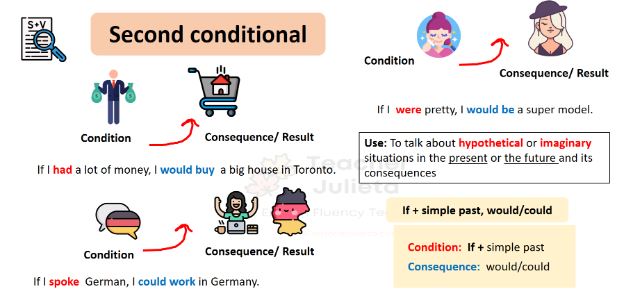We use the second conditional to talk about hypothetical or imaginary situations in the present or future.
In the if-clause we use simple past or past continuous.
In the other clause (consequence/result), we can use would, could or might.
Form: IF + SUBJECT + PAST SIMPLE, WOULD + INFINITIVE VERB
"IF I WON A FREE PLANE TICKET, I WOULD GO TO JAPAN"
-Negative: IF + SUBJECT + DIDN'T + INFINITIVE, WOULD(N'T) + INFINITIVE VERB
"IF I DIDN'T WORK SO MUCH, I WOULDN'T BE SO TIRED"
-Questions: IF + SUBJECT PAST SIMPLE, (QUESTION WORD) WOULD + SUBJECT + INFINITVE
"IF YOU COULD TRAVEL ANYWHERE, WHERE WOULD YOU GO?"
For the verb be, we usually start our sentence with If + subject + were
For examples:
If I were rich, I’d buy a Ferrari
If he were/ was rich, he’d buy a Porsche.
When we want to give advice, we always use If I were …
Examples:
If I were you, I wouldn’t go there.
If I were you, I’d travel to Brazil instead of Australia.




No comments:
Post a Comment